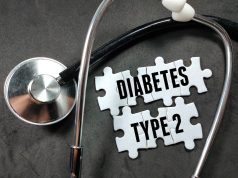HbA1c cut-off of 6.3 percent differentiated teens that remained in glycemic control, lost control
MONDAY, Nov. 16, 2015 (HealthDay News) — For adolescents with type 2 diabetes, hemoglobin A1c (HbA1c) after metformin monotherapy predicts the likelihood of durable glycemic control on oral therapy, according to a study published online Nov. 4 in Diabetes Care.
Phil Zeitler, M.D., from the University of Aurora School of Medicine in Colorado, and colleagues analyzed data from the TODAY randomized clinical trial of adolescents with type 2 diabetes. Participants were defined for analysis as those who remained in glycemic control for at least 48 months of follow-up or those who lost glycemic control before 48 months. Outcome group was analyzed in univariate and multivariate models as a function of baseline characteristics and biochemical measurements.
The researchers found that only HbA1c and insulinogenic index at randomization remained significant in multivariate models which included factors that were significant in univariate analysis (P < 0.0001 and P = 0.0002, respectively). The HbA1c cut-off that optimally distinguished the groups was 6.3 percent (positive likelihood ratio, 3.7); sex-specific cut-offs were 6.3 and 5.6 percent for females and males, respectively (positive likelihood ratios, 4.4 and 2.1, respectively).
“Identifying youth with type 2 diabetes at risk for rapid loss of glycemic control would allow more targeted therapy,” the authors write. “Adolescents with type 2 diabetes unable to attain a non-diabetes range HbA1c on metformin are at increased risk for rapid loss of glycemic control.”
Several authors disclosed financial ties to the pharmaceutical industry; the TODAY Study Group received donations from pharmaceutical companies.
Copyright © 2015 HealthDay. All rights reserved.








